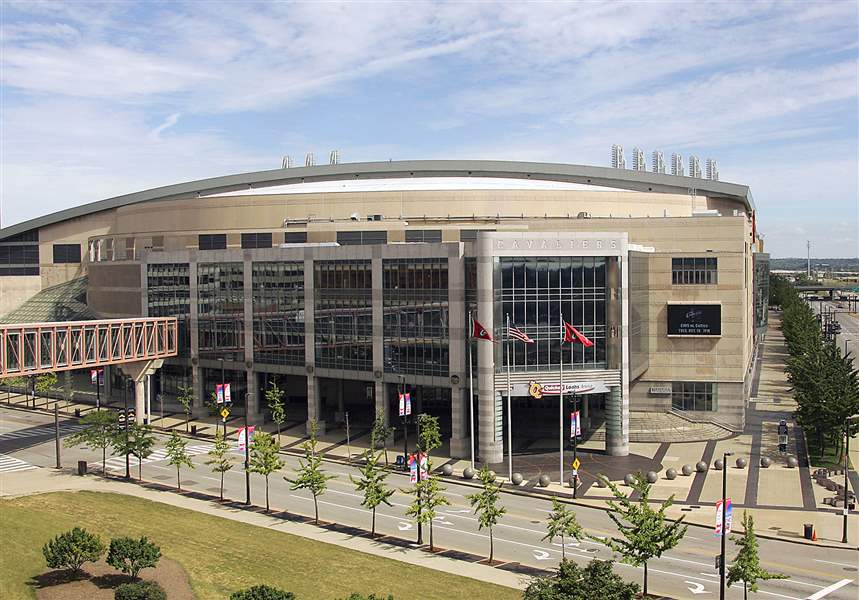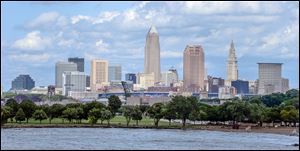
Cleveland basks in glow of GOP decision
Bipartisan effort credited with bringing 2016 convention to city needing a lift
7/13/2014
Cleveland’s Quicken Loans Arena will be the main site for the GOP Convention.
ASSOCIATED PRESS

Promoters predict that the GOP National Convention will lure upward of $200 million to Cleveland between now and when the delegates leave the city on Lake Erie in the summer of 2016.
CLEVELAND — While it may already have been eclipsed by the LeBron James news, Cleveland’s coup in landing the 2016 Republican National Convention boosted the spirits of a town used to shrugging off affronts to its image.
“I think it’s a pretty big deal,” said Mark Souther, a Cleveland State University historian who has studied the city’s psyche for his scholarly work in progress, “Believing in Cleveland: Managing Decline in ‘The Best Location in the Nation.’ ”
Mr. Souther described a casual lecture he had delivered at a trendy west side restaurant right after the convention news was announced.
“Every time I mentioned RNC, there were cheers,” he said. “People see this as a big deal, a big deal in a city not known for winning.”
The bipartisan effort in luring the Republican events was the result of an extensive civic campaign that enlisted a cast that included a Republican governor, his Democratic opponent in their looming 2014 race, the city’s Democratic mayor, and business leaders at every level.
“It’s a huge deal, people are still talking about it, excited Democrats, Republicans, and independents,” said Robert Bennett, who as the state’s Republican national committeeman, was a key booster of the Cleveland bid.
Mr. Bennett said that one of the keys in crafting the proposal that would bring thousands of Republican partisans and attendant media hoards to the heavily Democratic city was that its promoters crossed political and civic divides.
“When I met with the mayor on this a year ago, we both agreed that it had to be led by a business committee … we made it a civic endeavor and I think that made a great difference.”
But he said the constant attention of the Democratic mayor, Frank Jackson, was a key asset in bringing the bid to fruition.
“The mayor was with the site selection committee, with the technical teams. Anyone who was interested in talking with the mayor, he was there from the time they arrived to the time they left.”

Cleveland’s Quicken Loans Arena will be the main site for the GOP Convention.
Among the other key Buckeye State players behind the bid were Republican Gov. John Kasich and Cuyahoga County Executive Ed FitzGerald, his Democratic challenger in the fall. With the region’s business community, they will have to shoulder the challenge of raising between $50 million and $60 million to pay for the massive event, which will take place between late June and mid-July in 2016.
Promoters of the event argue that that’s a good investment, predicting that it will lure upward of $200 million in spending between now and when the delegates head home. Such projections are typical for the political conventions and other mega events that literally and figuratively tax host communities.
Organizers of the last GOP convention, in Tampa, Fla., offered spending impact estimates north of $200 million. In 2004, political convention organizers in New York City said that year’s Republican event added $255 million to the city’s economy, while the Democratic convention in Boston was said to have contributed $156 million.
But some economists have questioned such rosy economic assessments.
Robert Baade, a professor of economics at Lake Forest College, was one of the authors of a 2008 analysis that looked at the overall economic impact of 18 national political conventions between 1972 and 2004. They concluded that despite spikes in some spending areas, their overall net impact on the region’s economies was negligible, with no statistically discernible impact on employment or personal income.
Mr. Baade argues that mega-event organizers typically multiply the number of guests anticipated by their typical daily spending on things like hotels and meals to come up with a seemingly plausible model of economic impacts.
But, Mr. Baade said, “It’s not that simple for reasons we describe. If you do an audit the impact an event has had, that kind of primitive analysis is not borne out [because] there are lots of financial inflows and outflows, lots of foregone opportunities, there’s a lot more to it.”
Two years ago, Mr. Baade and an economist from the University of Chicago, took a similarly skeptical look at projected spending from a highly touted NATO summit in Chicago.
“Hotel rooms for NATO officials and their support cast, for example, may simply displace spending by others who decided not to come to Chicago over that weekend,” they pointed out in an analysis in the Chicago Tribune.
Mr. Baade acknowledged that communities could bestow psychic benefits not easily captured in an economic model. Cleveland, eager to display a municipal turnaround belying mistake-on-the-lake jibes, clearly hopes to reap such a longterm rehabilitation of its image.
But Mr. Baade noted that any host city also faces the risk that events could blot its image, just as a bombing marred the 1996 Atlanta Olympics. In the classic example of an event backfiring, he pointed to the rioting that swept up demonstrators and police in Chicago’s 1968 Democratic Convention.
Cleveland is counting on a positive entry in the psychic ledger.
“We have the sense of having turned the corner,” said Mr. Souther, the Cleveland State scholar. “There’s a sort of long history, the burning river, certainly the late ’70s with the municipal default, [Former Mayor Dennis] Kucinich’s fraught relationship with business community. Now there’s a perception that there is a tremendous opportunity here. People are expecting the moon and the stars now and the pressure is going to be on Cleveland.”
Cleveland made an aggressive pitch for the Republican and Democratic conventions for 2016. Their RNC success suspended its Democratic bid, although Columbus is still a finalist for the DNC gathering.
The Democrats are not expected to announce their 2016 convention choice until later this year.
Former Pennsylvania Gov. Ed Rendell is one of the key figures orchestrating Philadelphia’s bid for that convention. The city he once led is in competition with Birmingham, Ala.; Columbus; Brooklyn, N.Y., and Phoenix for the Democratic event. Mr. Rendell was the mayor of Philadelphia when the city lured its last national political convention, the GOP gathering that nominated former President George W. Bush in 2000.
Just as Cleveland’s leaders hope to, Mr. Rendell used the event to shine a national spotlight on his city’s revitalized downtown.
After the Cleveland announcement, Mr. Rendell said he thought that Philadelphia’s chief competitors were now Columbus and Brooklyn.
Dave Leland, a former Ohio Democratic chairman and a Columbus resident, is rooting for an Ohio twofer in the convention sweepstakes.
“Having a convention in Columbus to go along with the convention in Cleveland would be a very interesting and positive experience,” he said.
He pointed to an interview RNC Chairman Reince Priebus gave after the Cleveland selection in which he said that one asset Cleveland had in the process was that it appeared hungrier than some of the other bidders.
“Cleveland really wanted it more,” Mr. Leland said while adding that Columbus shared that hunger for slightly different reasons.
For Cleveland, he said, the convention offers an opportunity to display a municipal rebirth. For Columbus, whose growth as a major city came much later than its Ohio neighbor, he said it would be a kind of debut on the national stage.
Block News Alliance consists of The Blade and the Pittsburgh Post-Gazette. James P. O’Toole is a reporter for the Post-Gazette.
Contact him at: jotoole@post-gazette.com or 412-263-1562.